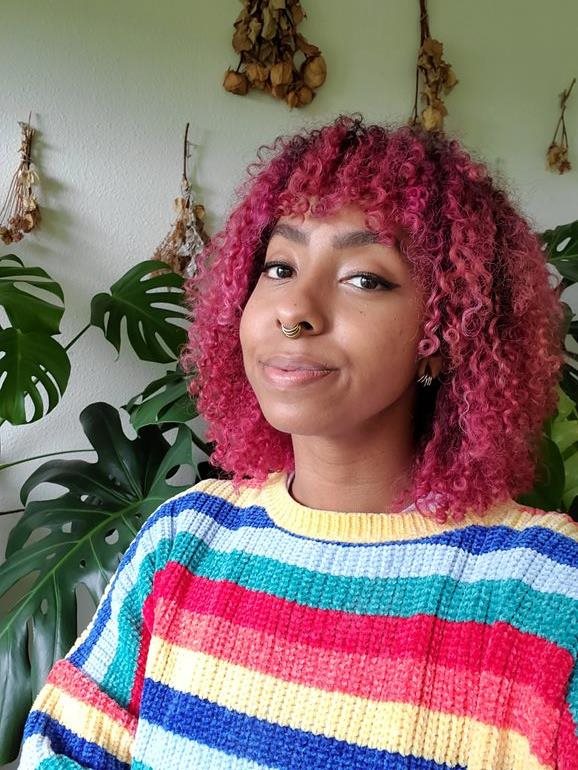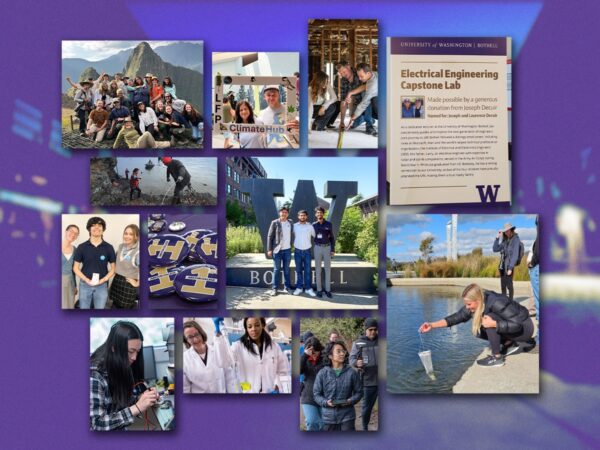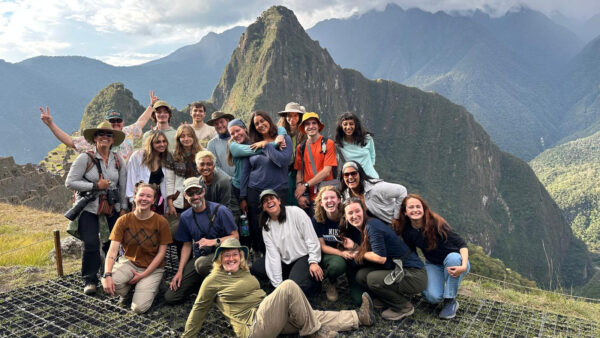Aaron Davis said the most important things she learned from the University of Washington Bothell can be summed up in two simple words: clarity and confidence.

“Clarity to understand the different methods and processes of making positive changes in the world,” Davis said, “confidence to act on those desires to help others.”
In her time as an undergraduate, Davis gained clarity in the classroom and used the confidence she gained to benefit her community. She spent the past four years volunteering at homeless shelters, working as a COVID-19 isolation and quarantine site program manager, and conducting research that instilled change in local organizations — all while raising two children who had been out of school due to the pandemic.
Dr. Nora Kenworthy, associate professor in the School of Nursing & Health Studies, said she would rank Davis among the top 10 students whom she has taught in her near decade-long career of teaching as a full-time faculty member at UW Bothell.
“When COVID-19 hit last spring, Aaron’s responsibilities only multiplied. She is a parent, a frontline worker in a high-risk environment and a Black woman serving her community as it is wracked by the twin pandemics of structural racism and the coronavirus,” Kenworthy said. “I have rarely in my life met someone so fearless, compassionate and deeply dedicated. The world is truly better with her in it.”
For these reasons and many more, Davis was named one of the UW’s 2021 Husky 100. Each year, the University recognizes 100 undergraduate and graduate students from the Bothell, Seattle and Tacoma campuses who are making the most of their time while at the UW. The recipients actively connect what happens inside and outside of the classroom, applying what they learn to make a difference on campus and in the community. Davis is one of 12 students from UW Bothell to be recognized in 2021.
Greater good
Before the pandemic, Davis worked as an overnight shelter manager at Mary’s Place, a nonprofit organization in the Seattle area that provides safe, inclusive shelter for women and families. When COVID-19 hit, she saw how unprepared the organization was to house multiple sick people.
“It’s communal living — if one person gets sick, it is likely everyone in the building will get sick,” Davis said. “That pushed me to frontline work because I knew what the unsheltered community needed, and I was prepared to provide it.”
She transitioned to a role as an isolation and quarantine site program manager with King County. “If there was an outbreak in a homeless shelter or in an encampment, we would do rapid testing around the city and offer anyone infected with a safe place to go and stay,” Davis said. “We had hotels set up with nurses on-site to house people while they recovered and quarantined.”
Serving marginalized populations of color in such a vital way is Davis’ dream job. “I made real impacts on the health of the communities I served during a global pandemic, and I did so by applying the skills I gained in the classroom to the populations I treated out in the field.
“I wouldn’t have been able to do such meaningful work without the confidence, skills and education I gained at UW Bothell,” she said.
Sparking change
Through a community-based learning project that took place last year, Davis was able to further assist the unsheltered. She partnered with Rainer Valley Midwives to help pregnant, unhoused mothers. “My own experience as a mother and being raised by a mother who struggled led me to work from the heart,” Davis said. “My lived experiences drive me to work toward addressing the growing inequities in maternal and child health, and it is truly work I am proud to take on.”
Using the UW Bothell standard community assessment tool she learned as part of her Health Studies degree, she built a survey of questions to ask mothers at Mary’s Place about what they wanted, and needed, out of services during a pandemic. She discovered that most mothers were not able to go to their regularly scheduled trimester appointments because they had been cancelled due to the virus.
“They weren’t getting basic checks that tell them if their baby is doing okay,” Davis said. “It’s really important to have those early checks that can detect diseases so parents can make informed decisions and plans.”
The survey also uncovered a lack of vitamins, nutrition and pregnancy-friendly food. “We immediately started brainstorming organizations we could partner with that could deliver fresh fruits and vegetables,” she said, “and discounted prenatal vitamins, too.”
After a recent follow-up with the midwives, Davis learned the organization plans to continue pursuing better care for homeless mothers. “The midwives I spoke with said that my work was extremely valuable to their organization and that they have been strategizing based off of my recommendations,” Davis said. “That felt pretty amazing.”
Seizing the moment
Davis graduated in June with a degree in Health Studies and two minors, one in Health Education & Promotion, and another in Global Health. She is now a full-time student in the Maternal and Child Health track in the Department of Epidemiology at the University of Washington’s School of Public Health.
“I wanted to show my kids that anything is possible,” Davis said. “I come from a family that historically has a hard time graduating high school, so to not only get my bachelor’s degree but also to move on to get my master’s degree is something I am extremely proud of.”
Davis said both of her children have been watching her closely throughout her educational journey. “They constantly remind me of how proud they are of the work I have done in the community and the recognition I have gained along the way,” she said. “Having them cheer me on really affirms the work and helps keep me driven.”
Looking back on her time as an undergraduate, Davis said the memories she cherishes most come from her work in community activism.
“UW Bothell instilled this sense of community in me and made me want to go out and be a part of the place I was in and help better the space around me,” she said. “The connections I made at UW Bothell made me lean into helping during the pandemic.
“I love that this is an institution that makes helping, giving back and supporting one another an easy task.”


